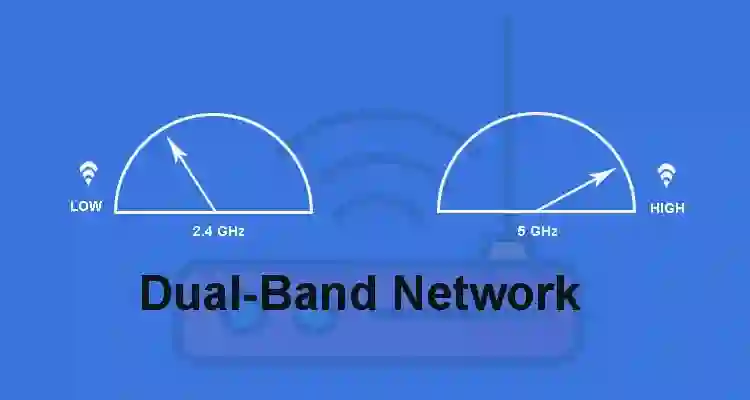Internet in the home is a very important and basic necessity, but choosing the right solution is complicated from so many options on the market. If you don’t have proper information about dual band routers and specifications. You’re not alone.
In this article, we are describing dual-band routers, how they work, what are the benefits compared to similar products. It is also known as DB. We are going to cover all the basics that help you to choose a DB router if it’s right for you.
What does the band mean in the router?
In simple words, the router transmits the signals to your wireless devices when you connect a phone, tablet, laptop, or another Wi-Fi-enabled device. The signal travels along with two frequencies 2.4Ghz or 5Ghz in a dual-band router. On a single-band router, only 2.4Ghz frequency will be available.
Dual-band Explanation
A dual-band router provides signals in two separate frequencies 2.4Ghz and 5Ghz. A D.B. router allows the number of connections at the same time Taking advantage of two bands, without having an internet speed issue.
Advanced and more digital devices are only compatible with the 5Ghz band. In addition, to use the 5Ghz band you need a dual-band or tri-band wireless router. As a result, few modern devices only support 5Ghz and you will experience faster speed.
Dual-band routers offer improved speed and reliability and allow split internet usage between these two bands. To maintain acceptable speed and connectivity across devices, each band takes a smaller volume of traffic.
5Ghz is better than 2.4Ghz then why does it come in routers?
Specifically, many Wi-Fi devices in the home only support 2.4Ghz frequency, you might face lower speed or network interference in 2.4Ghz. Yes, it is true if you live in a populated area.
Dua-band wireless networking benefits
By creating a different wireless interface of each band, a dual-band router gives more faster and flexibility to the home network. Whereas, some devices are compatible with 2.4Ghz and some advanced devices need additional network bandwidth that 5Ghz offers.
A dual-band router provides a better connection for each device as per requirement. Many single-band users may suffer from wireless interference due to 2.4Ghz of consumer gadgets prevalence. As an example, a cordless phone follows the frequency hopping spread spectrum modulation process so the signal spreads around the 2.4GHz spectrum instead of sitting in one channel.
Some other devices like microwave ovens can also interfere with the wireless signal because they “leak” signals during operation. But don’t worry 5Ghz on a router prevents this problem because they support 23 non-overlapping channels.
Dual-band wireless routers also allow MU-MIMO radio configurations, which allows providing higher performance for the home network as well as combinations of several radios in one band with D.B. support extremely better than the single-band router.
What is the difference between single-band, dual-band, and tri-band routers?
Single-band router
In older versions, the router comes with a single-band frequency only a 2.4Ghz frequency band. If still, you have one of these routers in your home, all the devices like gaming consoles, phones, tablets, laptops, will run only on this band.
So this can impact WI-Fi speed and makes it slower.
Dual-band router
A dual-band wireless networking router provides 2.4Ghz and 5Ghz frequencies bands. These routers split traffic across multiple pathways. That’s why, you are able to browse the internet, play online games with less network interference or without WI-FI speed latency. As a result, compared to a single-band, a dual-band router offers improved speed and reliability.
Tri-band router
Tri-band routers are recently launched in the market. These routers host a single 2.4Ghz and two 5GHz signals. If you want maximum bandwidth along with a fast and reliable internet connection in your home, then these routers are a good choice. Unexpectedly, the tri-band routers are the most expensive at this time, but if your household uses Wi-Fi heavily it might be a worthwhile investment.
Pros and cons of a dual-band router
Pros –
- Fast internet speed and reliable connection than single-band routers.
- The device can automatically connect and change to the best frequency band (if they are compatible).
- Compatibility with older and newer devices.
- Affordable price.
Cons
- Very expensive than a single-band router.
- 5Ghz frequency might be not compatible with all older devices.
- If you are using Wi-Fi just for basic tasks like checking mail, internet browsing then it might have unnecessary features for you.
- As people upgrade their routers 5Ghz will slow down.
Dual-band routers are common nowadays, also available at a cheap price. If you have a single-band router and facing low internet speed. Upgrade your router to this technology. This is the best way to increase internet connectivity and to improve Wi-Fi coverage.

